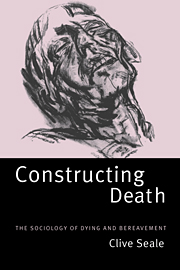5 - The revival of death awareness
Published online by Cambridge University Press: 28 October 2009
Summary
There is a perception, in postmodern times, of an anti-heroic ethos (Featherstone 1992). Everyday life, which is routine and taken for granted, in whose reproduction and maintenance women play an important part, where there is an emphasis on sociability and care, resists being cast as a grand narrative. Here, there is no place for the self-defining adventurer, whose life trajectory involves departure from mundane concerns, the deliberate courting of risks and a struggle to reach extraordinary goals. The hero returns to the acclaim of those left behind, whose narrative constructions of events see the hero's life as the fulfilment of destiny, so that such stories act as myths for future generations. This is an essentially masculine fantasy, we are told, outdated in a time of more equalising ideals, where every person has a uniform right to be heard, and there is general distrust of solutions that are imposed from on high, or by the powerful. The civilising process has led us to see that even kings and queens have personal lives, and media representations concentrate on the exposure of these to the public gaze, thus reversing any tendency to project transference heroics on such people.
It would be a mistake wholly to accept this argument. Clearly it has some resonance if we consider the decline of religious grand narratives, the distrust in science, and the spread of democratic ideals.
- Type
- Chapter
- Information
- Constructing DeathThe Sociology of Dying and Bereavement, pp. 91 - 121Publisher: Cambridge University PressPrint publication year: 1998



